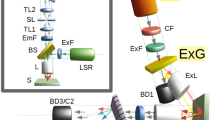Abstract
THE principal method of studying the bonding characteristics of adsorbed species is to use infrared vibrational spectroscopy. Although the method has been applied to an extensive range of adsorbates and substrates, the technique suffers from the problem that, because of substrate adsorption, only high frequency modes of vibration of the adsorbate can be detected. The Raman effect would seem to offer an alternative method of study.
This is a preview of subscription content, access via your institution
Access options
Subscribe to this journal
Receive 51 print issues and online access
$199.00 per year
only $3.90 per issue
Buy this article
- Purchase on Springer Link
- Instant access to full article PDF
Prices may be subject to local taxes which are calculated during checkout
Similar content being viewed by others
References
Karagounis, G., and Issa, R., Nature, 195, 1196 (1962).
Brandmüller, J., Z. angew. Phys., 5, 45 (1953).
Beattie, I. R., in Chemistry in Britain, August (1967).
Sidarov, A. N., Dokl. Akad. Nauk. SSSR, 95, 1235 (1954).
Author information
Authors and Affiliations
Rights and permissions
About this article
Cite this article
HENDRA, P., LOADER, E. Laser Raman Spectra of Sorbed Species Physical Adsorption on Silica Gel. Nature 216, 789–790 (1967). https://doi.org/10.1038/216789a0
Received:
Issue Date:
DOI: https://doi.org/10.1038/216789a0
This article is cited by
-
Laser Raman Spectra of Sorbed Species
Nature (1968)
Comments
By submitting a comment you agree to abide by our Terms and Community Guidelines. If you find something abusive or that does not comply with our terms or guidelines please flag it as inappropriate.



